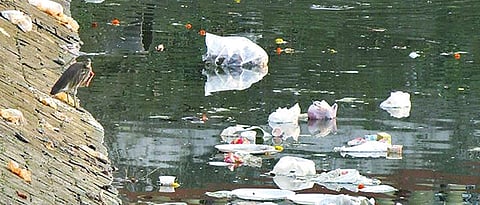

The Maharashtra government has implemented the plastic ban from March 23 this year. The decision was announced by State Environment Minister Ramdas Kadam after a meeting with officials from municipal corporations from the Mumbai Metropolitan Region (MMR) and Maharashtra Pollution Control Board (MPCB), district collectors and divisional collectors at Mantralaya.
The minister said there will be a 100 per cent ban on all types of plastic bags including plastic wrappers, sachets, plastic cups, glasses and all single-use plastic items and the ban will be extended to thermocol vessels like dishes and cups. It was decided that in the second phase, there will be a ban on milk pouches and milk will be supplied in glass bottles. In the third phase, there will be a ban on plastic pet bottles used as containers for cold drinks. Before banning pet bottles, cold drink companies will be asked to find an alternative.
The issue of plastic waste was in the news after the floods in Mumbai. Several reports blamed plastic bags for blocking storm-water drains in the city. After the floods in 2005, the State government, headed by then chief minister Vilasrao Deshmukh, decided to ban plastic bags. After the Cabinet passed the proposal, the plastic industry approached the Congress high command and the government then banned only plastic bags below 50 microns.
Talking about the decision taken by the State government, Mohammed Dilawar, Founder of Nature Forever Society, said, “The Nature Forever Society welcomes the decision taken by the government to ban plastic bags as the long-awaited decision has been finally taken, which will help the environment and society in a big way.”
When asked about how some sections of the society are unhappy with the ban and are protesting, he said, “We should give some time for proper implementation of the ban. The government has taken a step in the right direction and so it the duty of citizens to support the government. The ban on plastic is a long procedure and so it won’t happen overnight and there will be a lot of hurdles which should be studied and solutions found.
The government will have to find alternatives, spread awareness and work on the challenges that come in the way of implementing the plastic ban and citizens should play a vital role in the implementation by cooperating with the authorities.”
According to a study, plastic bags were introduced in the 1970s and have gained a lot of popularity among consumers and retailers as they are easily available, cheap and convenient to use. A vast variety of bags are discarded after a single use and according to a study, it is estimated that 500 billion plastic bags are used every year worldwide. Plastic, which is convenient to use, is harmful to the environment due to the chemical compounds, which adversely affect wildlife, wildlife habitats, marine animals and humans.
Dilawar said, “Social media platforms can be used very effectively to spread awareness among people of the hazards of plastic on human health and our environment and also about the alternatives that can be used instead.”
As many people are connected with each other through social networks like Facebook, Twitter, WhatsApp, it can be used as an effective tool to spread the message, he added. But for the success of any project, collective steps and initiatives by the citizens and the government are important. The ban cannot be implemented without proper participation from citizens.
Reasons to refuse single-use plastic
- They are made from fossil fuels
- They leave behind a huge carbon footprint
- Not biodegradable, or degrades over hundreds of years
- Only a tiny per cent is recycled
- Releases toxins in foods and drinks
- Pollutes oceans
- Kills marine animals
- Enters our food chain
STEPS to reduce use of plastic
- Carry a reusable bag whenever you go shopping or to the grocery store
- Choose cardboard, recycled paper over plastic items
- Say no to straws
- Skip bottled water
- Avoid buying items packed in plastic
- Use reusable mugs while drinking coffee or other beverages
- Avoid excessive food packaging
- Say no to disposable cutlery
